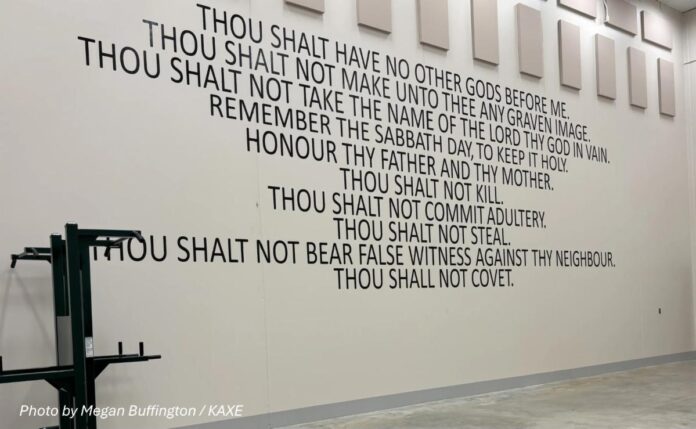A new $75 million jail recently completed in Itasca County, Minnesota has sparked backlash from some residents for having a two-story mural of the Ten Commandments in the facility’s gym, as well as other motivational statements on faith and governance throughout the jail. The Freedom From Religion Foundation (FFRF) is pressuring county administrators to remove the displays, falsely claiming they violate the First Amendment Establishment Clause.
“The message to county officials is simple: Repaint and repent,” the FFRF stated in a press release. The FFRF then demanded the county apologize to its constituents “for wasting money on two paint jobs.”
FFRF also sent a letter to county officials stating Itasca County’s religious displays violate “government neutrality” on religion and are unconstitutional. Notably, in the letter, the FFRF cites now outdated and invalid cases involving the recently overruled “Lemon Test,” which had been used by Courts to interpret government overreach into religion and remove religious displays from government buildings. However, the U.S. Supreme Court terminated that test in 2022 and has allowed expressions of faith on government property.
Itasca County Sheriff Joe Dasovich stated he is weighing the decision to remove or keep the displays, which also includes the phrase “one nation under God,” as well as a quotation from President Ronald Reagan that reads, “Within the covers of the Bible are the answers for all the problems men face.” While Sheriff Dasovich acknowledged the complaints and a potential lawsuit, he also said there is tremendous outpour of support to keep the displays.
Notably, with the recent death of the “Lemon Test,” Itasca County is well within the law to keep its displays. The “Lemon Test” is dead, and every case that has relied on it since the 1971 Lemon v. Kurtzman opinion is no longer good law.
In 2022, the U.S. Supreme Court overruled and eliminated the “Lemon Test” over a series of rulings. The first ruling that struck a blow was Liberty Counsel’s 9-0 victory in Shurtleff v. City of Boston on May 2, 2022. The case involved censorship of Christian viewpoints regarding flag raisings. The High Court unanimously rejected Boston’s use of the “Lemon Test” to censor Christian viewpoints on a public flagpole. Then on June 27, 2022, the Court buried the “Lemon Test” in Kennedy v. Bremerton School District ruling 6-3 that the school district could not suppress private religious speech, such as silent prayer, on the school football field after games. Liberty Counsel argued in its amicus brief that since the Establishment Clause provides no justification for suppressing Coach Joe Kennedy’s private, religious speech to silently pray on the football field after games, the “Lemon Test” should be overruled. In burying the “Lemon Test” in Kennedy, SCOTUS cited Liberty Counsel’s decision in Shurtleff involving the Christian flag.
The Supreme Court replaced the “Lemon Test” with a new “test” based on “historical practices and understandings.” The High Court explained that courts should look at the historical practices at the time the Establishment Clause was ratified to “faithfully reflect” the understanding of the Founders in determining the extent of religious expression in the public square.
However, FFRF’s request for Itasca County to remove the Ten Commandments does not mention these pivotal cases or ground its legal reasoning in current law. The FFRF has resorted to false arguments.
The Ten Commandments provide a basic code of conduct and have played a significant role in the development of American law and policy that predates the Constitution. Currently, there are many displays of the Ten Commandments embedded in the architecture of the U.S. government.
In the U.S. Supreme Court, there are about 50 displays of the Ten Commandments. There is a prominent display at the Library of Congress engraved in bronze on the floor of the National Archives. The Ten Commandments are also on the outside of the Ronald Reagan International Trade Building. Moses is engraved in stone over the Speaker of the U.S. House of Representatives and the Ten Commandments is in the seal of the Ninth Circuit Court of Appeals. And the list goes on and on.
Liberty Counsel’s Founder and Chairman Mat Staver said, “There is no need for Itasca County officials to ‘repent’ for its Ten Commandments display. The ‘Lemon Test’ has been dead for almost two years and any case that relied upon its questionable framework is no longer valid. Today, the line between religious expression and governmental endorsement is determined by original and historical practices, and the Ten Commandments have long been displayed in this nation for centuries as a symbol of law.”
















